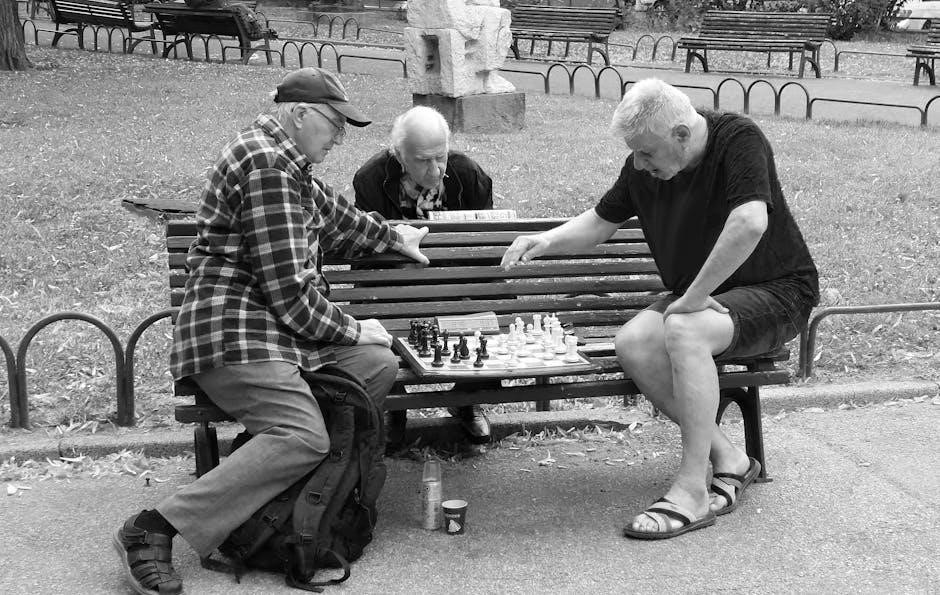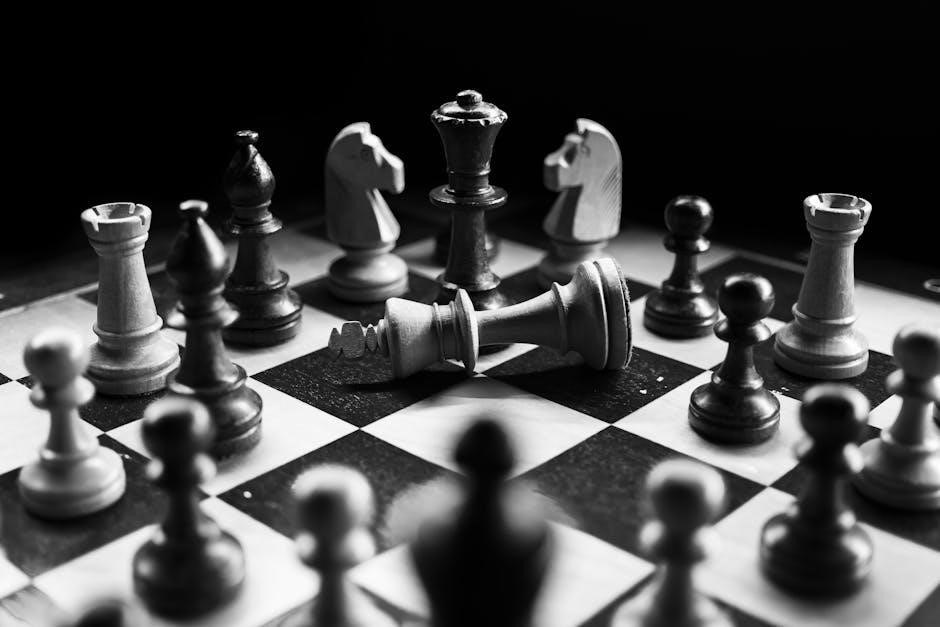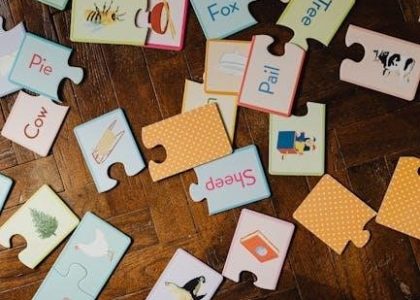Periodically evaluating your chess skills is essential for growth. Resources like Sharpen Up Your Chess! and expert podcasts offer insights to refine strategies and set achievable goals.
1.1 Understanding the Importance of Self-Assessment in Chess
Self-assessment is crucial for identifying strengths and weaknesses in your chess game. By regularly reviewing your performances, you can pinpoint areas needing improvement. Resources like Sharpen Up Your Chess! and expert podcasts provide guidance on refining strategies and setting realistic goals. A structured study plan, combined with tools like chess notation, helps track progress and maintain focus. Embracing self-assessment fosters a growth mindset, enabling players to adapt and evolve their skills effectively over time.
1.2 Setting Realistic Goals for Improvement
Setting realistic goals is vital for steady progress in chess. Break down larger objectives into smaller, achievable tasks, such as mastering specific openings or improving endgame techniques. Utilize resources like Sharpen Up Your Chess! and structured study plans to guide your efforts. Track progress through journals or ratings to stay motivated. Celebrate small victories to maintain momentum, ensuring goals remain challenging yet attainable. This approach fosters consistent growth and helps players stay focused on their chess improvement journey.
Foundational Concepts of Chess Improvement
Mastering basic strategies, pawn structure, and notation is crucial. Resources like Sharpen Up Your Chess! and expert podcasts provide essential insights for building a strong foundation.
2.1 The Role of Chess Notation in Analyzing Games
Chess notation is a vital tool for analyzing games, allowing players to record and review moves accurately. It helps identify mistakes, understand strategies, and track progress over time. By studying annotated games, players can gain insights into tactical and positional play. Resources like Chess.com and instructional books emphasize the importance of notation in improving skills. Regular review of your games using notation can significantly enhance your ability to learn from errors and refine your techniques.
2.2 Basic Strategies for Beginners
Mastering basic strategies is crucial for new players. Controlling the center, developing pieces quickly, and protecting the king are fundamental. Understanding these principles helps build a strong foundation. Resources like Dan Heisman’s guides and online platforms such as Chess.com provide clear instructions. Beginners should focus on simplifying positions and avoiding unnecessary risks. Practicing these strategies regularly ensures steady improvement and prepares players for more advanced concepts. Consistency and patience are key to developing a solid chess understanding.
2.3 The Significance of Pawn Structure
Pawn structure is a critical element in chess strategy, often dictating the flow of the game. Pawns can block or open lines, support attacks, and defend key squares. A well-structured pawn chain can control the center and create long-term plans. Conversely, weak pawns can become targets. Understanding pawn flexibility and how to manipulate the structure is vital. Players should study common pawn structures to recognize patterns and opportunities. This knowledge enhances overall positional awareness and decision-making, making it a cornerstone of chess improvement for players of all levels.

Key Areas of Chess Improvement
Mastering tactical awareness, endgame techniques, and opening strategies are crucial for improvement. These areas, supported by expert resources, help players reassess and enhance their chess skills effectively.
3.1 Enhancing Tactical Awareness
Improving tactical skills is vital for chess success. Regular practice with puzzles and analysis of master games helps develop pattern recognition and calculation abilities. Resources like Sharpen Up Your Chess! and expert podcasts provide structured guidance. Tactical awareness allows players to spot opportunities and threats, making decisive moves during games. Consistent training with interactive tools and endgame drills further refines these skills, enabling better decision-making and overall performance improvement. Mastery of tactics is foundational for advancing in chess, as highlighted by experts like Dan Heisman.
3.2 Mastering Endgame Techniques
Endgame mastery is crucial for converting advantages into wins. Studying fundamental principles, such as king activity and pawn promotion, is essential. Resources like Dan Heisman’s guides and online tools provide detailed drills. Practicing common endgame scenarios, like rook and bishop endings, improves technique. Analyzing master games reveals strategic decisions in simplified positions. Regular review of endgame strategies ensures confidence in critical moments. This focused study enhances overall performance and transforms near-wins into victories, as emphasized by experts and interactive learning platforms like Chess.com.
3.3 Developing a Deep Understanding of Chess Openings
Mastering chess openings requires studying fundamental principles like control of the center and rapid piece development. Resources such as Sharpen Up Your Chess! and Dan Heisman’s guides provide insights into popular openings. Analyzing master games reveals strategic ideas behind initial moves. Understanding key variations and transpositions is vital for avoiding traps. Regular practice and review of opening strategies ensure a solid foundation. This knowledge enhances decision-making in the early game, setting the stage for long-term success, as highlighted by experts and interactive tools like Chess.com.
The Role of Study Materials
Chess improvement relies on quality study materials. Books like Sharpen Up Your Chess! and resources from Dan Heisman offer strategic insights. Online tools and podcasts enhance learning.
4.1 Recommended Chess Books for Improvement
Essential books like Sharpen Up Your Chess! by Armin Juhasz and works by Dan Heisman provide structured guidance. These resources offer insights into tactical patterns, endgame techniques, and strategic planning, aiding players in reassessing their skills. They emphasize practical advice, helping to bridge the gap between theory and application. By studying these materials, players can identify weaknesses and develop a clearer understanding of chess fundamentals, ultimately enhancing their overall performance and decision-making at the board.
4.2 Utilizing Online Resources and Tools
Online platforms like Chess.com offer extensive tools for improvement, including interactive lessons and game analysis. Players can practice with computer opponents, explore openings, and review endgames. Resources like The Perpetual Chess Podcast provide insights from grandmasters and coaches, while chess engines help analyze games for tactical misses. These tools enable structured study, allowing players to track progress and refine strategies effectively. Leveraging online resources enhances learning and accelerates skill development in a dynamic and accessible way.
4.3 The Benefits of Following Chess Podcasts
Chess podcasts, like The Perpetual Chess Podcast, offer valuable insights from grandmasters, coaches, and experienced players. They provide diverse perspectives on improvement strategies, helping listeners refine their skills. Podcasts often cover topics like tactical awareness, endgame techniques, and opening strategies, making them a convenient way to learn. By following these shows, players gain practical advice, stay motivated, and develop a deeper understanding of the game. This resource is especially useful for those seeking inspiration and guidance to enhance their chess journey.

Practical Steps for Improvement
Implementing a structured study plan, practicing regularly, and analyzing your games are crucial steps. These actions help identify weaknesses and track progress effectively over time.

5.1 Creating a Structured Study Plan
A well-organized study plan is vital for consistent improvement. Allocate specific time for tactics, endgames, and openings. Use resources like Chess.com and Dan Heisman’s guides to focus on key areas. Regularly review games to identify weaknesses and track progress. Incorporate a mix of theoretical study and practical play to maintain balance. Adjust the plan periodically to address new challenges and ensure steady growth in your chess skills over time.
5.2 The Importance of Regular Practice
Consistent practice is crucial for improving chess skills. Regular play sharpens tactical awareness and reinforces strategic concepts. Utilize tools like Chess.com for interactive lessons and coach bots to simulate real-game scenarios. Playing against computer opponents of varying skill levels helps refine techniques and builds confidence. Dedicate time daily to practice, focusing on specific areas such as openings or endgames. Regular practice ensures steady progress and a deeper understanding of the game, making it essential for long-term improvement and achieving chess mastery.
5.3 Analyzing Your Own Games
Reviewing your games is vital for identifying mistakes and missed opportunities. Use chess engines to analyze moves and uncover tactical errors. Focus on critical moments where decisions could have been improved. This process enhances pattern recognition and strategic understanding. Regular self-analysis helps refine your thought process, leading to better decision-making during games. By learning from your mistakes, you can eliminate recurring errors and develop a more robust playing style. Tools like Chess.com offer detailed analysis, making it easier to track progress and improve effectively over time.

Leveraging Technology in Chess Training
Leverage technology to enhance your chess training with engines, online lessons, and practice tools, improving strategy and tactics efficiently.
6.1 Using Chess Engines for Analysis
Chess engines like Stockfish and Leela Chess Zero provide powerful tools for analyzing games. They offer objective evaluations, highlighting mistakes and suggesting improvements. By reviewing your games with these engines, you can identify patterns and refine your strategies. Engines also help explore complex positions and practice tactics. Utilizing engine analysis regularly enhances your understanding of chess principles and accelerates improvement. These tools are indispensable for players aiming to elevate their skills and gain deeper insights into the game.
6.2 Interactive Online Chess Lessons
Interactive online chess lessons offer personalized learning experiences, helping players improve specific skills. Platforms like Chess.com provide guided study plans, focusing on openings, endgames, and tactics. These lessons often include real-time feedback, allowing players to correct mistakes instantly. Many platforms also feature live sessions with experienced coaches, enabling direct interaction and tailored advice. Such resources are invaluable for applying theoretical knowledge in practical games, making them a key component of modern chess improvement strategies. They cater to all skill levels, ensuring players can grow at their own pace.
6.3 Playing Against Computer Opponents
Playing against computer opponents is a highly effective way to improve chess skills. Modern chess engines and AI-based tools offer adjustable difficulty levels, catering to players of all strengths. Platforms like Chess.com provide options to play against computer opponents with varying styles, from tactical specialists to positional players. This allows for targeted practice, helping to identify and address weaknesses. Additionally, computer opponents are always available, enabling consistent practice and reinforcing lessons learned from online courses or study materials. Regular play against AI fosters strategic thinking and tactical precision, essential for overall improvement.

The Psychology of Chess Improvement
Mental resilience and confidence are crucial for progress. Overcoming plateaus and maintaining motivation require strategic mindset adjustments and consistent practice to stay focused and driven.
7.1 Overcoming Plateaus in Progress
Plateaus in chess improvement are common but surmountable. Adjusting study routines, seeking external feedback, and incorporating mental exercises can reignite progress. Reviewing games with tools like chess engines or coaches often reveals overlooked patterns. Engaging in structured study plans and diversifying training methods, such as focusing on endgames or tactics, can also break stagnation. Maintaining a growth mindset and celebrating small victories helps sustain motivation during challenging periods.
7.2 Building Confidence in Decision-Making
Confidence in chess decision-making grows through practice and analysis. Studying master games and endgame techniques helps internalize key principles. Regularly reviewing your own games with tools like chess engines reveals recurring mistakes and strengths. Setting realistic goals and celebrating small victories fosters a positive mindset. Engaging in interactive lessons and podcasts, such as The Perpetual Chess Podcast, provides diverse perspectives to refine your strategy. Over time, this structured approach builds trust in your abilities, enabling sharper, more decisive play during critical moments of the game.
7.3 Managing Time and Motivation
Effective time management is crucial for consistent chess improvement. Create a structured study plan, balancing tactics, endgames, and openings. Set realistic goals and celebrate small victories to stay motivated. Utilize online resources like The Perpetual Chess Podcast for inspiration and guidance. Regular practice, even in short sessions, helps maintain momentum. Stay positive and persistent, as progress often follows overcoming challenges. Motivation grows from seeing improvement and enjoying the learning process, ensuring long-term dedication to mastering the game.

Advanced Strategies for Experienced Players
Experienced players refine their skills through advanced tactics, complex endgames, and strategic planning. Resources like Sharpen Up Your Chess! offer expert insights to elevate gameplay and reassess strategies effectively.
8.1 Advanced Tactical Patterns
Mastering advanced tactical patterns is crucial for experienced players. Techniques like forks, pins, and skewers can transform positions. Reassessing games reveals missed opportunities, while resources like Sharpen Up Your Chess! provide expert strategies. Studying grandmaster games and using tools like chess engines can deepen pattern recognition. Regular practice and analysis refine tactical execution, enabling players to exploit weaknesses effectively. This systematic approach elevates gameplay, ensuring consistent improvement and a competitive edge.
8.2 Complex Endgame Scenarios
Mastering complex endgame scenarios requires precision and foresight. Positions involving king and pawn play, rook endgames, and bishop maneuvers demand deep study. Reassessing your approach to these scenarios can reveal overlooked opportunities. Resources like Dan Heisman’s insights and interactive tools offer guided practice. Analyzing grandmaster endgames and practicing theoretical positions enhance proficiency. Regular review of these scenarios ensures players can convert advantages into wins, even in tense, double-edged situations. This focus on endgame mastery is a cornerstone of advanced chess improvement.
8.3 Strategic Planning in Long Games
Strategic planning in long games involves evaluating positions deeply and creating long-term plans. Players must balance immediate threats with overarching goals, such as controlling key squares or preparing for a decisive attack. Reassessing your strategy during the game is crucial, as positions evolve. Resources like Dan Heisman’s insights and interactive tools can help refine these skills. Studying grandmaster games and practicing prophylactic thinking are essential for mastering strategic play in prolonged battles, ensuring you adapt and thrive in complex, dynamic situations.

The Role of Coaches and Mentors
Coaches and mentors offer personalized feedback and expert strategies, accelerating improvement. Resources like books and podcasts supplement learning, providing diverse perspectives for comprehensive growth.
9.1 Finding the Right Chess Coach
Finding the right chess coach can significantly accelerate your improvement. Look for coaches with experience and qualifications, such as Grandmasters or International Masters. Consider their teaching style and ability to explain concepts clearly. A good coach will provide personalized feedback, help set realistic goals, and guide you through complex strategies. Additionally, many coaches offer structured lesson plans and homework to reinforce learning. Platforms like Chess.com and podcasts often recommend reputable coaches, making it easier to find a mentor who aligns with your needs and skill level.
9.2 Learning from Grandmasters
Learning from grandmasters is a powerful way to elevate your chess skills. These experienced players share insights into advanced strategies, thought processes, and game analysis. By studying their games and teachings, you can gain a deeper understanding of complex concepts. Many grandmasters offer lessons, videos, and written content, providing structured guidance. Their expertise helps you identify weaknesses and improve decision-making. Additionally, their ability to break down intricate ideas makes learning accessible for players of all levels, ensuring you can apply their knowledge effectively to your own games.
9.3 The Value of Peer Review
Peer review is a valuable tool for chess improvement, allowing players to gain fresh perspectives on their games. By discussing strategies and mistakes with fellow players, you can identify blind spots and refine your techniques. Collaborative learning fosters a deeper understanding of the game, as others may notice patterns or ideas you overlooked. Additionally, peer feedback can motivate you to stay consistent in your study routine. Engaging in regular peer review sessions can significantly accelerate your progress, making it an essential part of your improvement journey.

Tracking Progress and Staying Motivated

Regularly tracking your chess progress through journals and ratings helps maintain motivation. Celebrating small victories and reflecting on growth ensures consistent improvement and a positive mindset.
10.1 Keeping a Chess Journal
A chess journal is a powerful tool for documenting your progress. By recording your games, thoughts, and strategies, you can identify patterns and areas for improvement. Experts like Dan Heisman emphasize the importance of reflecting on your moves and mistakes. Writing down your insights helps solidify learning and track growth over time. Regular journaling also fosters motivation, as you can celebrate small victories and stay focused on your goals. This practice, combined with resources like Chess.com, enhances your ability to reassess and refine your chess skills effectively.
10.2 Measuring Improvement Through Ratings
Tracking your chess rating is a clear way to measure progress. Platforms like Chess.com provide detailed ratings that reflect your performance over time. By analyzing these metrics, you can identify strengths and areas needing improvement. Regular play and consistent practice are key to seeing rating increases. Additionally, resources like the Perpetual Chess Podcast offer insights into how ratings correlate with skill development. Monitoring your rating helps set realistic goals and stay motivated, ensuring your efforts translate into tangible improvement. This data-driven approach complements your chess journal and study plan effectively.
10.3 Celebrating Small Victories
Celebrating small victories is crucial for maintaining motivation. Recognizing progress, no matter how minor, reinforces positive habits and builds confidence. Whether it’s winning a tactical puzzle, improving endgame play, or executing a well-planned strategy, acknowledging these achievements keeps you engaged. Tools like Chess.com and the Perpetual Chess Podcast offer insights to track and celebrate these milestones. By doing so, you stay motivated and focused on your journey, ensuring steady improvement and a enjoyable learning process.





